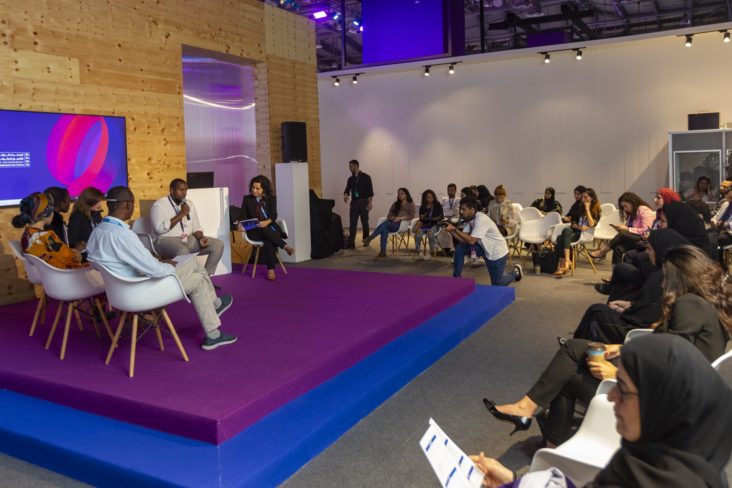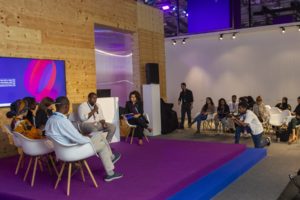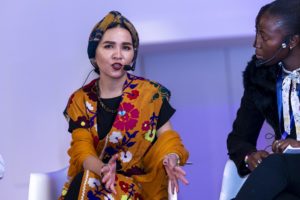‘Inspiring Stories Of Refugees’ By The Big Heart Foundation Bring Moving Tales Of Struggle And Success To IGCF 2020

“When you overcome insurmountable hardships to achieve something, you wear your lessons as a badge of victory. I was a refugee, and it was hard to say the least,” shared Fatimah Hossaini, an Afghan refugee returnee.
Fatimah was speaking on the inaugural day of the ninth edition of the International Government Communication Forum (IGCF 2020), at a panel session title ‘Inspiring Stories of Refugees’ held by The Big Heart Foundation (TBHF) in collaboration with UNHCR.
She added, “I therefore decided to get out of my comfort zone and go back to Afghanistan and start teaching at Kabul University. I wanted to help other people who live through difficult conditions by sharing what I know and have learnt.”
The session was attended by Kenya refugees and Afghan refugees in Pakistan who took to stage and shared inspiring tales of their survival and success despite difficult circumstances. In November 2019, TBHF visited the Kakuma refugee camp in Kenya – home to 192,301 residents of 22 nationalities – to assess the various challenges facing them.
Moderated by Raefah Makki, UNHCR Communication Officer in UAE, the panel discussion featured Hina Shikhani, Afghan Refugee, Global Refugee Forum co-sponsor and DAFI scholar in Peshawar, Pakistan; Fatimah Hossaini, Afghan refugee returnee and teacher of photography and design at Kabul University, Afghanistan; Jessy Volonte, Refugee from DRC living in Kakuma Camp/Kenya, co-founder of Solidarity Initiative for Refugees and ICT Instructor; Mohamad Hassan, Somali Refugee in Kakuma Camp, Kenya, Co-chair of World Economic Forum 2019 and Refugee rights advocate on the global stage; and Muhamad Hure, UNHCR Field Officer in Kakuma Camp/Kenya.
Panellists shared their perspectives and experiences, aiming to inspire displaced and vulnerable communities to never lose hope, work hard for a better life for themselves and others.
Discussion says education will enable refugees achieve a better-quality life
During the panel discussion the participants stressed on the importance of education and talked about how quality education is the only tool to improve the quality of life of refugees.
Talking about the role of education in the life of refugees, Mohamad Hassan said, “For people who are not refugees, education is important, but for those who live in the harshest of circumstances and do not have access to basic human necessities, a good education can be the difference between life and death. It’s not because an education allows you to be employed, but first, because it allows you to dream.”
He added, “When I used to read, sitting inside the make-shift tents, the books allowed me to dream beyond my realities and work hard for a better life. When you have to leave behind everything – your friends, your home, your school – everything – and come to a new place, you have no choice but to start from scratch. And how do you do that? With a book and a pen. Education is the only way out of the problems that one faces due to refuge and displacement.”
DAFI (Albert Einstein German Academic Refugee Initiative) scholarship holder, Hina Shikhani, remarked: “When I met other refugees, I realised that something needs to be done. I believe education is not a luxury; it is a basic human right. When we talk of refugees we are talking about millions of creative minds, which were forced into displacement. We have to understand that we need education not just to increase literacy numbers, but to empower people so they can be more humane.”
The panel discussed possible solutions to overcome these challenges through collective efforts, partnerships and innovation, and shined light on the Global Compact for Refugees (GCR), the multi-stakeholder KISEDP initiative for social-economic integration of refugees and highlighted ways to increase private sector participation in the humanitarian field in line with government service delivery mechanisms.
IGCF 2020 has brought together 64 leading global thinkers, top government officials and communication experts from 16 countries around the world who are leading discussions and debates across 57 diversified events. The forum concludes on Thursday.





